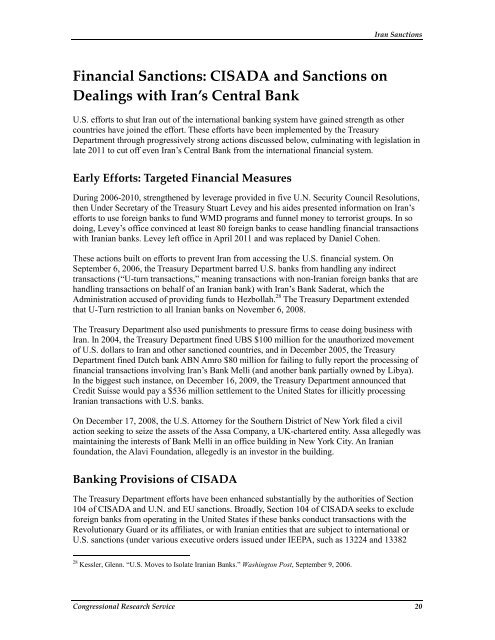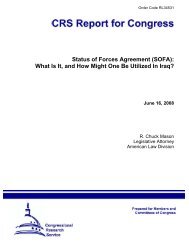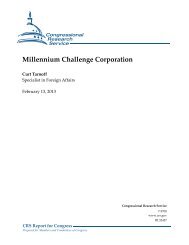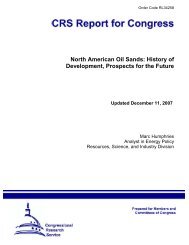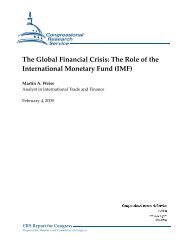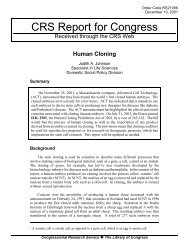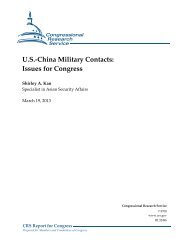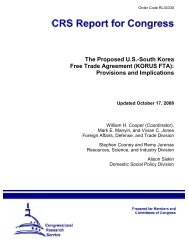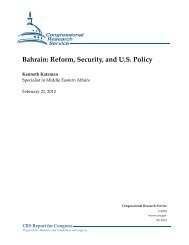Iran Sanctions - Foreign Press Centers
Iran Sanctions - Foreign Press Centers
Iran Sanctions - Foreign Press Centers
Create successful ePaper yourself
Turn your PDF publications into a flip-book with our unique Google optimized e-Paper software.
Financial <strong>Sanctions</strong>: CISADA and <strong>Sanctions</strong> on<br />
Dealings with <strong>Iran</strong>’s Central Bank<br />
<strong>Iran</strong> <strong>Sanctions</strong><br />
U.S. efforts to shut <strong>Iran</strong> out of the international banking system have gained strength as other<br />
countries have joined the effort. These efforts have been implemented by the Treasury<br />
Department through progressively strong actions discussed below, culminating with legislation in<br />
late 2011 to cut off even <strong>Iran</strong>’s Central Bank from the international financial system.<br />
Early Efforts: Targeted Financial Measures<br />
During 2006-2010, strengthened by leverage provided in five U.N. Security Council Resolutions,<br />
then Under Secretary of the Treasury Stuart Levey and his aides presented information on <strong>Iran</strong>’s<br />
efforts to use foreign banks to fund WMD programs and funnel money to terrorist groups. In so<br />
doing, Levey’s office convinced at least 80 foreign banks to cease handling financial transactions<br />
with <strong>Iran</strong>ian banks. Levey left office in April 2011 and was replaced by Daniel Cohen.<br />
These actions built on efforts to prevent <strong>Iran</strong> from accessing the U.S. financial system. On<br />
September 6, 2006, the Treasury Department barred U.S. banks from handling any indirect<br />
transactions (“U-turn transactions,” meaning transactions with non-<strong>Iran</strong>ian foreign banks that are<br />
handling transactions on behalf of an <strong>Iran</strong>ian bank) with <strong>Iran</strong>’s Bank Saderat, which the<br />
Administration accused of providing funds to Hezbollah. 28 The Treasury Department extended<br />
that U-Turn restriction to all <strong>Iran</strong>ian banks on November 6, 2008.<br />
The Treasury Department also used punishments to pressure firms to cease doing business with<br />
<strong>Iran</strong>. In 2004, the Treasury Department fined UBS $100 million for the unauthorized movement<br />
of U.S. dollars to <strong>Iran</strong> and other sanctioned countries, and in December 2005, the Treasury<br />
Department fined Dutch bank ABN Amro $80 million for failing to fully report the processing of<br />
financial transactions involving <strong>Iran</strong>’s Bank Melli (and another bank partially owned by Libya).<br />
In the biggest such instance, on December 16, 2009, the Treasury Department announced that<br />
Credit Suisse would pay a $536 million settlement to the United States for illicitly processing<br />
<strong>Iran</strong>ian transactions with U.S. banks.<br />
On December 17, 2008, the U.S. Attorney for the Southern District of New York filed a civil<br />
action seeking to seize the assets of the Assa Company, a UK-chartered entity. Assa allegedly was<br />
maintaining the interests of Bank Melli in an office building in New York City. An <strong>Iran</strong>ian<br />
foundation, the Alavi Foundation, allegedly is an investor in the building.<br />
Banking Provisions of CISADA<br />
The Treasury Department efforts have been enhanced substantially by the authorities of Section<br />
104 of CISADA and U.N. and EU sanctions. Broadly, Section 104 of CISADA seeks to exclude<br />
foreign banks from operating in the United States if these banks conduct transactions with the<br />
Revolutionary Guard or its affiliates, or with <strong>Iran</strong>ian entities that are subject to international or<br />
U.S. sanctions (under various executive orders issued under IEEPA, such as 13224 and 13382<br />
28 Kessler, Glenn. “U.S. Moves to Isolate <strong>Iran</strong>ian Banks.” Washington Post, September 9, 2006.<br />
Congressional Research Service 20


